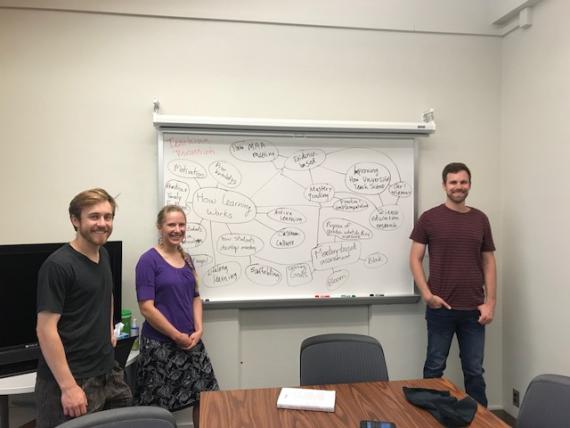By Jacob Price (graduate) and Kelsey Marcinko, Applied Mathematics PhD students
In Fall 2017, one of the authors of this article (Jake Price) organized a graduate student reading group focusing on topics in college mathematics education. The other author (Kelsey Marcinko) has been an extremely active member of the new group. We sought to familiarize ourselves and the department with the current state of college mathematics education research. The group, which consisted of approximately 8 graduate students, began meeting weekly to read about evidence-based research into pedagogical methods, share their teaching experiences, and discuss the nature of mathematics teaching.
During the fall, we read and discussed How Learning Works: Seven Research-Based Principles for Smart Teaching by Marie K. Norman, Marsha C. Lovett, Michael W. Bridges, Michele di Pietro, and Susan A. Ambrose. This excellent text distills down the key ideas of learning in a readable manner. It is replete with examples and extensive references to research. This was an excellent first text for us, as it helped us establish a common language for talking about challenges and opportunities in teaching at the college level. The ideas summarized in this book were found again and again throughout all subsequent reading. Its extensive bibliography made it easy to start branching into more specific teaching practices.
During the winter, we read a variety of research articles on the general topic of “mastery-based grading systems.” These grading systems establish clear learning goals and assign grades exclusively based upon a student’s mastery of the selected goals by the end of the quarter. Students may attempt to demonstrate mastery many times without consequences. The research on this topic is extensive and fascinating. Most mastery-based grading systems lead to an increase in student comprehension. Several group members implemented mastery-based grading systems in their courses and gathered student feedback on the practice.
In the spring, we focused on Improving How Universities Teach Science: Lessons from the Science Education Initiative by Carl Wieman in preparation for his Boeing Seminar visit. This book is aimed at administration and faculty more than the average teacher, but still offers a fascinating view into the process of systematically updating the teaching style of a department as a whole. After an illuminating discussion with Carl during his visit, the group began brainstorming means of implementing what we had learned in the department culture. We held a roundtable discussion with faculty members and began considering how to conduct publishable research on teaching applied mathematics.
The conversations of the past year surrounding college mathematics education are already influencing members of the group in their course organization and teaching methods. During the summer quarter, Kelsey Marcinko has been teaching Introduction to Differential Equations while fellow student Ben Liu is the instructor for Beginning Scientific Computing. Both Kelsey and Ben have been implementing teaching strategies and methods informed by the group’s conversations and reading. As an example, Kelsey’s course in differential equations includes explicitly stated learning goals for every homework assignment. Ben has added additional learning goals to his course: he has incorporated plotting and visualization requirements to expand students’ understandings of multifaceted approaches to problem solving. We continue to be excited about bringing research-based teaching ideas to the classroom.
With Jake’s graduation, Kelsey Marcinko is stepping into the role of facilitating the group’s reading and conversations for the 2018-2019 academic year. One of our continuing goals for the coming year is to explore conducting a research study on the use of active learning techniques in one of the undergraduate courses in our department. We look forward to conversations with the UW Biology Education Research Group as we design and conduct a research study. Additionally, Kelsey had the opportunity to organize a session of talks on innovative teaching methods at the PNW MAA annual meeting at Seattle University in April. These talks provided a wealth of ideas and additional resources for continued discussion in the upcoming year. Other ideas for topics have resulted from attending talks at the SIAM Conference on Applied Mathematics Education in July in Portland. The group is currently in the process of compiling books and articles of interest on the departmental Wiki page to make these resources available throughout the department. As we begin meeting consistently again in the fall, we will likely discuss the MAA Instructional Practices Guide. We hope to continue to provide a space in our department for enthusiasm and growth in the area of college mathematics education!
